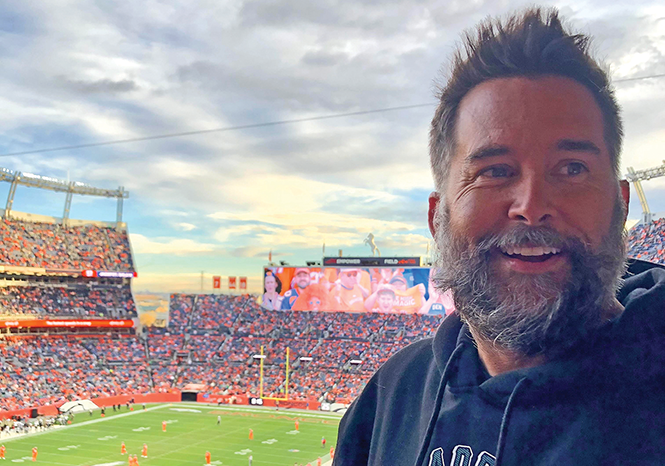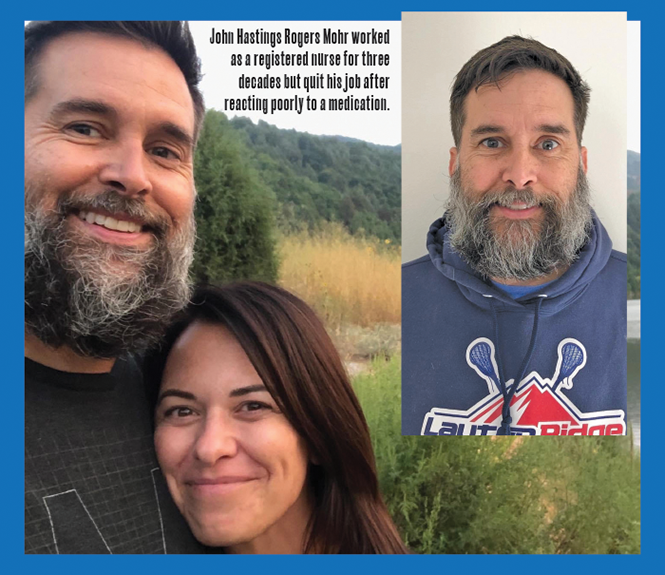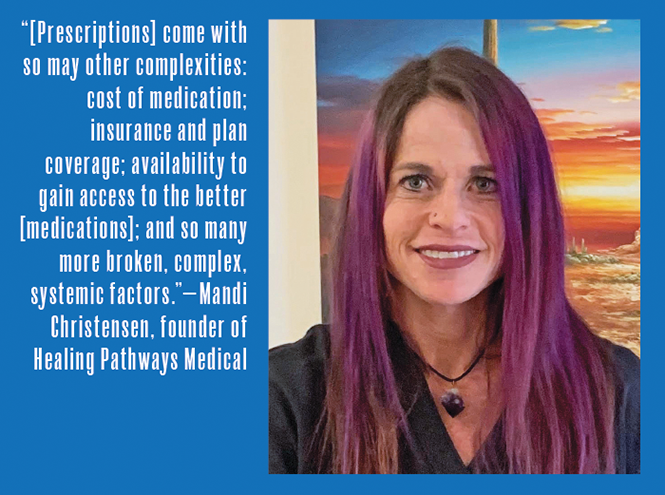Editor's Note: If you or someone you know is struggling with suicidal thoughts or mental health matters, please call the 988 Suicide and Crisis Lifeline.
On April 30, I returned home from running errands, and my life was completely upended. Entering the bedroom, I discovered that my 51-year-old husband had committed suicide.
Even more traumatic than finding his lifeless body, however, has been examining the five months that preceded it and discovering that our family's tragedy might have been prevented. Ultimately, I believe the fault for my husband's death lies with a broken medical system and all-too-common negligence around the prescription of psychotropic drugs.
More than 10% of Americans use psychotropic drugs—including antidepressants and antipsychotic medications—up from 6% in 1994, according to the American Psychological Association (APA). During that same period, the ratio of Americans prescribed more than one psychotropic drug at the same time more than doubled, from 1.2% to 3.1%.
And following COVID-19, roughly one-fourth of Americans took or are taking some form of psychiatric medicine, a broader umbrella of mental health drugs. In this category, the United States "leads" the world.
"Six in 10 practitioners reported that they no longer have openings for new patients," an advisory at the top of the APA's website states. "Nearly half said they have been unable to meet the demand for treatment, and nearly three-quarters have longer waitlists than before the pandemic."
While psychotropic treatments are beneficial and helpful to many—especially when appropriately prescribed, administered and monitored—various studies have shown that as many as 85% to 90% of patients report experiencing at least one adverse side effect on these medications. And while those side effects can be minor, they can also manifest as severe disruptions with all-too-often catastrophic consequences like an increased risk of suicide, particularly in cases of "polypharmacy," or the taking of more than one psychotropic drug at a time.
My husband, John Hastings Rogers Mohr, worked as a registered nurse for almost 30 years. He thrived taking care of his patients, and he took pride in providing for me and our two sons. For most of his life, he had no record of depression nor had he ever been suicidal.
John was a much beloved employee, friend, son, husband and father. I would learn later that such descriptions are not unusual among those who take their own lives, and particularly those whose deaths coincide with negative reactions to medication.
John and I would have celebrated our 23rd wedding anniversary in May. We loved each other's company and did almost everything together.
He was a hands-on dad from the beginning. I never had to ask him to feed, change, hold, get up in the night or care for his boys. John loved nothing more than being with his family, which was obvious to everyone who knew him. In September of 2021, John was promoted to a new position at work that increased his stress level, but no more than would be expected. The bigger stressor was that his mother was having health issues, and she was one of the most important people in his life. Having lost his dad the previous year, John had been consistently helping and worrying about his mom and thought he might even have to stay at her nearby home in order to provide care.
By early December, and unbeknown to me, John's primary care physician had prescribed olanzapine—the generic version of Zyprexa—for the anxiety he was experiencing, and that's when things shifted for the worse.
Change of Soul
A few days into his taking what I would later learn is a powerful psychotropic—developed to treat schizophrenia and bipolar disorder, John's doctor texted asking how he was doing on the medication. John responded that it was helping with his constant worrying but giving him a little bit of a flat affect. "Stick with it," the doctor said.
My crash course in modern medicine following John's death would reveal that today's medical practice contains a strange contradiction.
The word "psychotropic" is from Greek and literally means "soul turning" or "mind changing." Initially developed to treat severe emotional and mental conditions, psychotropic drugs were intended to be dispensed by mental health professionals. However, over time, general practice physicians also began prescribing these medications.
John's primary care physician was an internist, whose focus is on the internal organs of adults rather than the mind. He was someone John had known since childhood. Around Christmas 2021, I started to glimpse the changes occurring within John and remember telling him that he seemed distant. He had always loved the holidays and sitting in the family room with the lights, tree and decorations. This time, he retreated to the bedroom.
We had two Christmas parties and, in the past, he was always helpful and the one to initiate games. This time, that didn't happen. I just chalked it up to the stress of work, because his mom was actually doing better by then.
John started to comment on his memory and not being able to remember things. I told him it was normal, we were getting older, but he said I didn't understand. Later, I would come to learn that a loss of memory and the ability to retain information is not unusual for patients on olanzapine and similar medications. I've since joined Facebook support groups where patients or their surviving loved ones share harrowing tales of "brain fog" while on or coming off their prescriptions.
A great deal of controversy is currently raging in both the scientific and lay communities regarding the effectiveness of psychotropic drugs. One extreme claims the medications offer almost no positive benefit to offset the serious risks, aside from the mind-tricking placebo effect. The other extreme boasts that up to 90% of patients find some relief in taking their prescriptions (the National Alliance on Mental Illness, or NAMI, reports a success rate between 70 and 90 percent). And of course, a wide range of opinions exists between those two poles.
But these divided schools of thought are relatively close to agreement on the rate of serious adverse drug reactions, reporting a range from roughly 5% of patients on the low end to 20% of patients on the high end. Even if the smaller percentage is more accurate, it speaks to the need for patients on psychotropics to be monitored closely and their treatment regimens carefully adjusted. If not, that's when tragedies can happen.
Following Christmas, John became more distant with us. He struggled to make it through each day and wasn't himself. He wasn't sleeping well; he worried and got anxious about minor things. In late January, he had a panic attack at work and was told to take a few days off. At the time, unaware of his prescriptions, I thought he might be having a midlife crisis.
Warning Signs
At home, John would pace or—if he sat down—constantly move a knee up and down while rubbing it, a common drug side effect known as akathisia. His new job involved working with the homeless and individuals with addictions, and John came to believe that he, too, was an addict.
He would look at me as if he were the most horrible person on earth, and he would remind me that for many years he had been taking a daily half-tablet of the pain reliever Ultram (tramadol) to treat chronic pain from a hip replacement and fused ankle. I asked if he had lied about his dosage, but he swore he hadn't. And when I later reviewed his pharmacy records, they indicated that he was on schedule with the proper dosage. I told him that he was beating himself up unnecessarily, but he announced that he had flushed his pain meds down the toilet.
In January, John made the sudden, seemingly irrational decision to resign from his job. I pleaded that he take the time off that his boss had offered him to seek help, but he said that he was upset with himself for not being able to do something he was qualified for. He complained that he couldn't remember anything, which made his new position too much to handle.
My new, much-too-late-in-coming awareness about how some people react to these drugs stems from the many people I've encountered who fought similar battles. They report experiencing severe anxiety that kept them in bed or from work with dark thoughts of wanting to end their lives, especially if they tried to come off their medications too quickly.
A 2022 study published in the online journal Addictive Behavior Reports found that after quitting (or attempting to quit) antipsychotic drugs, 72% of patients reported classical withdrawal symptoms like nausea, tremors, anxiety and agitation. But 52% categorized these effects as "severe" and 18% reported experiencing psychosis.
"These findings are consistent with a small but growing body of literature on this topic," the report states in its summary conclusion. "Prescribers need to inform themselves about the nature, frequency and intensity of withdrawal effects from [antipsychotics], and about withdrawal psychosis."
I found a therapist for John and, after the first session, his primary care doctor texted asking him how it went. John answered that he could "take it or leave it," but that it was nice to talk through his anxiety and get tips on how to deal with it. His doctor suggested continued counseling as treatment.
And yet, there was no discussion of possibly stopping the medication, so John continued taking it. Olanzapine carries a warning label that states it should only be prescribed for major depressive disorders and only after two failed attempts using other medications. Nowhere does it state that it is for treating mild anxiety.
I learned that John's medication was approved by the FDA to treat bipolar disorder and schizophrenia. But in 2009, it's maker settled a $1.4 billion lawsuit after its representatives were accused of marketing the drug to primary care physicians by misrepresenting its intended use.
That settlement was just one of several in the company's history related to the "off-label" marketing of its products, meaning the issuance of prescriptions to treat conditions other than those for which a drug was intended for and approved by regulators.
But for a major drug manufacturer, even a billion-dollar penalty is far from a fatal blow. And while recent reforms have narrowed the scope of off-label marketing, the practice continues among individual physicians with or without the encouragement of pharmaceutical representatives.
It wasn't until after John's death that I discovered the published warnings for his medication. Like many drugs prescribed to treat anxiety and depression, olanzapine is shown to backfire for some patients, causing them to become agitated, irritable or to display abnormal behavior.
Journals like Medicine note that side effects can include a deepening of depression and anxiety, and the inability to fall or stay asleep.
System Failure
On Feb. 4, John texted his doctor that he had gone down a "rabbit hole," overwhelmed by work and simple day-to-day tasks. He attributed this to his imagined "addiction" to tramadol.
On Feb. 9, John's doctor got him in to see a psychiatrist. She noted his prescriptions, his feelings of hopelessness and that he had guns in the house. No medications were changed.
On the 10th, John was distraught and pacing constantly. I called his physician, who told me to take John to the hospital emergency room.
He was displaying many of the serious side effects listed for his medications but to the best of my knowledge, none of the medical professionals who treated him asked why he was on a drug for schizophrenia and bipolar disorder when he had experienced neither.
John was admitted to the psychiatric unit, where he was also prescribed an SNRI (serotonin and norepinephrine reuptake inhibitor) antidepressant. He left the unit after two days, more hopeless than ever.
For some patients, such a crisis occurs shortly after going on such medications, which is especially pronounced in younger patients. For others, severe mental anguish can set in when trying to go off the drugs, which John may have tried to do.
One frequently cited study (Valuk, Orton, Libby: 2009) hosted on the National Institute of Health's PubMed database concludes that while there is "substantial confounding" in the link between antidepressant use and suicide, discontinuing a prescription and the initial period of a new medication regimen carry "significant risk for suicide attempt."
"The highest risk was associated with initiation, a finding consistent with other studies, closely followed by periods of dosing changes and discontinuation," the report states. "Patients should be closely monitored during these periods."
Facebook support groups are flooded with accounts of suicidal thoughts, attempts and "successes" when people go too quickly off psychotropic drugs. John's medical records do not have any notes that his doctors alerted him to this or took any intervening action when he reported extreme adverse reactions and other serious concerns.
I've now heard from several individuals who have—or their loved ones have—been taken off these drugs too quickly, or who have reduced their dosages or stopped taking them on their own. That rapid shift in gears can produce jarring results in the mind, and suicides can occur under such circumstances. Two nurse practitioners I know are reluctant to use olanzapine for this very reason and told me they would never have prescribed it for the simple anxiety John initially experienced.
Mandi Christensen, a physician's assistant and founder of Healing Pathways Medical, described Zyprexa as a "dirty drug," due to its lengthy list of side effects.
"Lots of metabolic problems and weight gain are associated with it and, in my opinion, there are so many other better medications out there that I don't believe it's even necessary to prescribe at all," she said. "However, that comes with so many other complexities: cost of medication; insurance and plan coverage; availability to gain access to the better meds; and so many more broken, complex, systemic factors."
Christensen said she's concerned about the complacency of some providers in not staying up-to-date on current research and medical evidence. But she attributed some of that to doctors feeling justifiably overworked and burned out, and she pointed to the outsize role of insurance companies in dictating the terms of medical care, including the amount of time that a provider is able to spend with their patients.
"Bottom line, to treat a patient correctly, you have to take time and listen," Christensen said. "An intensive patient history is imperative and that includes any history of trauma—especially as a child—family history and the symptoms the patient is reporting throughout time. It's a failing system, and it's repugnant, in my opinion."
John tried a ketamine treatment, but reacted to it poorly—thinking he wasn't going to make it out of the room alive—and never wanted to try again. He had sessions of EMDR therapy (Eye Movement and Desensitization and Reprocessing) but stated that it did not help.
A therapist wanted him to recall trauma from his life, but he didn't feel like he had any. I reminded him that he had lost two brothers and his father, but he responded that those were sad events but just a part of life that he didn't see as traumatic.
In one neurotherapy session, John said with a look of desperation, "I just want to be myself and be a normal family again." I now believe that these attempts at treatment weren't apparently helping while John was under the influence of his medications.
'You Don't Want What I'm Taking'
We agreed that John should stay at his mom's house for a few days to do some "soul searching," but we texted and talked every day. I asked him what brought him joy and he responded, "It's you and the boys, and I don't know why I can't snap out of this for you and them. I don't know what's wrong with me."
John was on medical leave and had up to three months available, but chose to resign after one month. He was now out of a job, had no insurance and was becoming paranoid, irrational and extremely depressed.
I later obtained John's medical records from his primary care doctor, which contain no entries as to why these drugs were ever prescribed, that John had ever experienced anxiety or depression previously, or that his doctor had warned John of the potential side effects and adverse reactions.
John's doctor told me that it could take four to six weeks for his meds to fully kick in and his symptoms improve. But at the time, I was only aware of the SNRI prescribed in the psych unit. By that point, John had been on olanzapine for two months.
The doctor made no mention of the fact that an antipsychotic he'd prescribed for a case of mild anxiety could have been a factor in any of this.
By mid-March, John was having a total meltdown. He was trying to prepare for a job interview and wasn't sleeping because he was staying up all night pacing and studying flashcards. He continued telling me that he couldn't remember anything.
I texted his doctor, reminding him of a stroke John had in 2014, and asked if he could get an MRI. When the results showed everything normal, John texted his doctor stating, "Then I'm just crazy." His doctor replied "Yep," followed by two laughing emojis.
Between December 2021 and April 2022, John had been taking different combinations of five prescriptions. The night before he died, I got upset with one of our son's lacrosse coaches, and joked to John that I needed to take his medications because he managed to remain so calm.
"You don't want what I'm taking," he said emphatically, looking me straight in the eyes.
We were together the next day, even lying down for a nap. But I left for an hour and a half and came home to find that John had taken his life with a .22 caliber rifle.
It was only after John's memorial service and hours spent wondering what had happened to the amazing, devoted husband and father I'd known for a quarter-century that my unwanted education on the powerful side effects of psychotropic drugs began.
What if a physician messes up and prescribes drugs that are doing more harm than good? What if medical professionals fail to closely monitor a patient and take corrective action that could have prevented tragedy?
Suing for malpractice is hardly a sure bet, as Utah is one of the 34 states that severely limit the amount for which doctors can be held liable. Currently, our state's maximum for damages is $450,000. With the typical attorney charging 33% or higher from a potential settlement amount, the fees are not lucrative enough to attract many firms.
Another avenue is a complaint with the Utah State Medical Board, which can be filed free of charge. The public agency assigns panels of specialists to evaluate treatments that go badly and, where deficiencies are found, take corrective or disciplinary action.
But my motivation in sharing our family's tragedy is less about seeking a monetary award than it is about helping others avoid the excruciating heartbreak of losing a loved one because of therapies that were sought after to help, but that can do harm.
If experiencing mild anxiety or depression, first try lifestyle modifications, which might include altering habits of diet, exercise, sleep or nutritional supplementation. Seek talk therapy from a highly recommended psychologist or other therapist and perhaps try something like biofeedback, holistic medicine, hypnotherapy, EMDR or other "alternative" therapies.
Meet with a trusted regular physician, but if you or your loved one is prescribed a powerful psychotropic like an antidepressant or antipsychotic, do your homework before starting. Even Wikipedia has good summaries of pharmaceuticals and lists their side effects and formal cautions. Discuss these with doctors and ask what they'll do if problems arise.
If a regular physician doesn't inspire confidence or is too quick to pull out the prescription pad, seek an opinion from a qualified mental health professional. And if the decision is made to take a psychotropic medication, alert family and close friends and ask them to keep an eye out for mood or behavior changes for the worse.
When it gets to the point of stopping such medications, scrupulously follow a lengthy timetable for tapering off. For many people this needs to happen even more slowly than the published schedule from the drug manufacturer.
Tap into resources like the National Suicide Prevention Program, which operates a lifeline that can be reached by dialing 988. If what I've learned through unwanted experience can help even one person avoid going through the living hell that John went through for five months and that his sons and I have endured since, it would help soften our pain.
Naomi Catano Mohr is an orthodontic treatment coordinator who looks forward to snowboarding with her two boys and enjoys watching them play lacrosse.
Latest in Cover Story
Readers also liked…
-
Forget the family pedigree—Robert F. Kennedy Jr should not be the next president of the United States
Trojan Horse
- Jun 21, 2023
-
Women decry harassment and toxic culture at St. George auto dealership
Men at Work
- Oct 11, 2023









